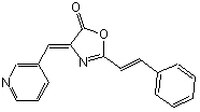324788 Sigma-AldrichDAPK Inhibitor - CAS 315694-89-4 - Calbiochem
The DAPK Inhibitor, also referenced under CAS 315694-89-4, controls the biological activity of DAPK.
More>> The DAPK Inhibitor, also referenced under CAS 315694-89-4, controls the biological activity of DAPK. Less<<Synonyms: (4Z)-4-(3-Pyridylmethylene)-2-styryl-oxazol-5-one, Death-Associated Protein Kinase Inhibitor
Recommended Products
Overview
| Replacement Information |
|---|
Key Spec Table
| CAS # | Empirical Formula |
|---|---|
| 315694-89-4 | C₁₇H₁₂N₂O₂ |
Pricing & Availability
| Catalogue Number | Availability | Packaging | Qty/Pack | Price | Quantity | |
|---|---|---|---|---|---|---|
| 324788-10MGCN |
|
Glass bottle | 10 mg |
|
— |
| References | |
|---|---|
| References | Okamoto, M., et al. 2009. J. Med. Chem. 52, 7323. |
| Product Information | |
|---|---|
| CAS number | 315694-89-4 |
| Form | Yellow solid |
| Hill Formula | C₁₇H₁₂N₂O₂ |
| Chemical formula | C₁₇H₁₂N₂O₂ |
| Quality Level | MQ100 |
| Applications |
|---|
| Biological Information | |
|---|---|
| Purity | ≥95% by HPLC |
| Physicochemical Information |
|---|
| Dimensions |
|---|
| Materials Information |
|---|
| Toxicological Information |
|---|
| Safety Information according to GHS |
|---|
| Safety Information |
|---|
| Product Usage Statements |
|---|
| Packaging Information | |
|---|---|
| Packaged under inert gas | Packaged under inert gas |
| Transport Information |
|---|
| Supplemental Information |
|---|
| Specifications |
|---|
| Global Trade Item Number | |
|---|---|
| Catalogue Number | GTIN |
| 324788-10MGCN | 04055977216127 |
Documentation
DAPK Inhibitor - CAS 315694-89-4 - Calbiochem SDS
| Title |
|---|
DAPK Inhibitor - CAS 315694-89-4 - Calbiochem Certificates of Analysis
| Title | Lot Number |
|---|---|
| 324788 |
References
| Reference overview |
|---|
| Okamoto, M., et al. 2009. J. Med. Chem. 52, 7323. |







